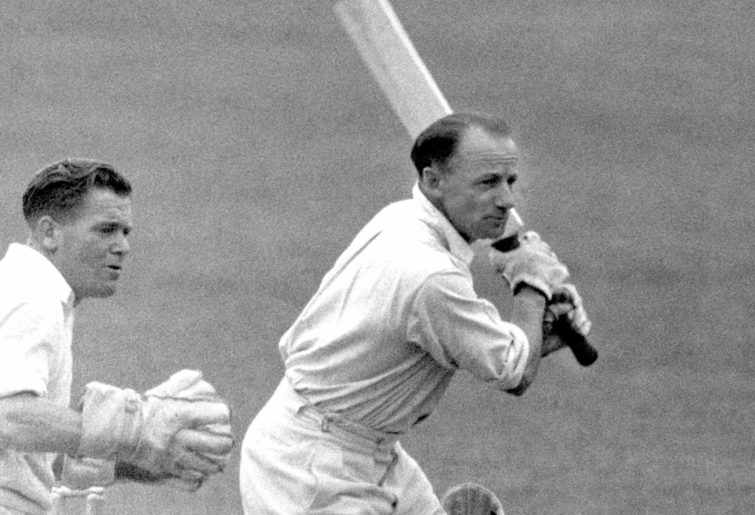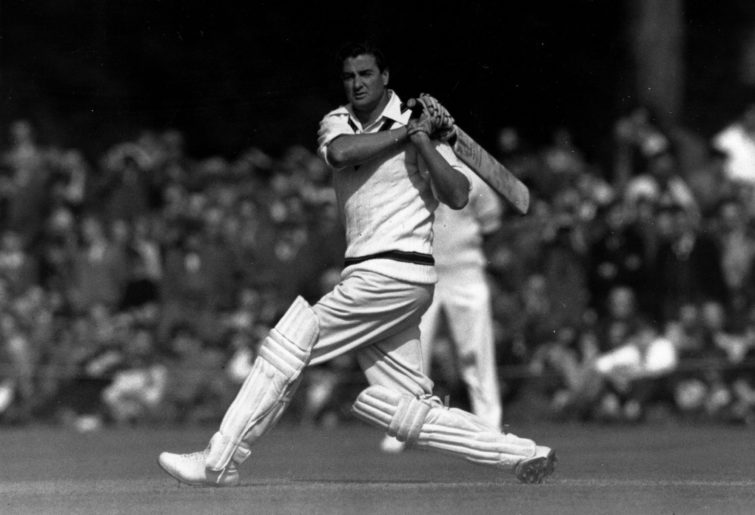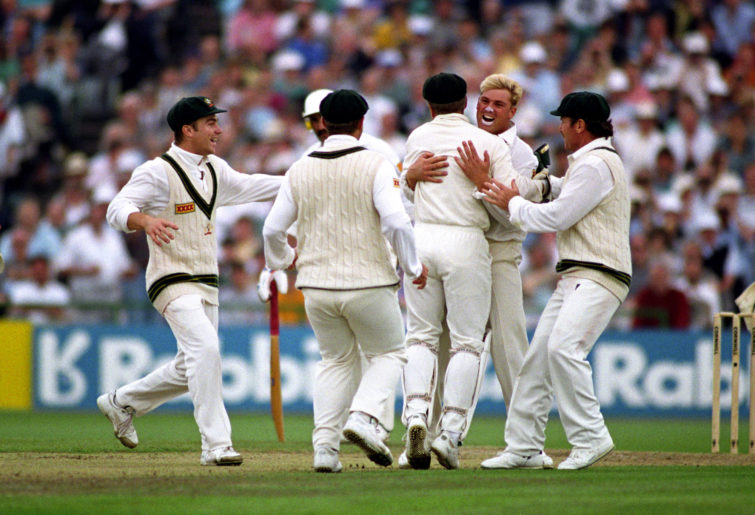Australia is the most successful nation in Test match history with more wins and a higher winning percentage than any other established nation in the history of Test cricket.
Selecting a side from almost 150 years of Test match cricket is no easy feat with many all-time greats not making the cut.
I’m assuming that this side will play a Test match at either the MCG or SCG so I’ve gone with a three-to-one fast bowler to spinner mix.
1. Matthew Hayden
Of the 30 Test match centuries scored by Hayden (the third most for an Australian), over half came during the three-year span between 2001-2003, when a more dominant, intimidating force at the top of the order has probably never been seen in the history of the game.
He put the fear of God into bowlers and laid the platform for the great Australian side of the late ’90s and early to mid 2000s. He is the only Australian opener to finish with a Test match average above 50. This was a relatively straightforward pick.
2. Bill Ponsford
The second opener’s spot is a coin flip between Ponsford and Arthur Morris, neither of whom I saw play. In the end I went with Ponsford as the right-hander to form a right hand-left hand opening combination.
All the literature about Ponsford describes him as a run machine with an appetite for massive scores. Only Brian Lara has the distinction of scoring 400-plus more than once in first-class cricket and Ponsford is the only man in history to break the world record for the highest first-class score twice.
He made a decent fist of Test match cricket too, averaging over 48, often playing on uncovered pitches in an era when the Australia’s top-order batting with Ponsford, Bill Woodfull and a young Don Bradman at three was its strength.
3. Don Bradman
He is probably the easiest pick in an all-time world XI let alone an all-time Australian XI. He is the greatest batsman in the history of the game and an icon for a generation of Australians struggling to get through the Great Depression of the late ’20s and early ’30s. He is probably the greatest Australian sportsperson or athlete that’s ever lived and is in the discussion for the greatest in any sport across any era. He is a true legend.

(PA Images via Getty Images)
4. Ricky Ponting
Only the incomparable Don Bradman can relegate Ricky Ponting, Australia’s greatest Test match run-scorer and century-maker, to the number four position. Most people remember the dropping of Michael Slater during the 2001 Ashes as the start of the great Hayden-Justin Langer opening partnership but forget that it also signified a permanent move to three in the batting order for the Tasmanian.
Up until that stage the man they call Punter was averaging in the early 40s and was forging a solid but not otherworldly career. Five 1000-run calendar years in the next seven years would see Ponting become one of the all-time great first drops and go on to be the key batsman in one of the greatest sides in Test history.
5. Steve Smith
Sometimes I still sit back and wonder if this bloke is the same guy that came onto the scene as a chubby leg spinner and lower-order batsman. I have no idea how a guy who bats like he does averages 62.84 after 73 Test matches but Steven Peter Devereux Smith is already one of the all-time greats and some believe second only to Bradman as a Test batsman.
There are many highlights of an incredible career – the twin hundreds in his comeback Test at Edgbaston in 2019, an insane ton on a crumbling pitch at Pune in 2017 and the three Ashes double hundreds. They all take a back seat to his 92 at Lord’s in the second Test of the 2019 Ashes series. I thought Steve Waugh was the gold standard for toughness but that day I was proven wrong. He is a special player. He keeps Greg Chappell, Neil Harvey, Allan Border and Waugh out of this side.
6. Keith Miller
He is the greatest all-rounder in the history of Australian cricket by the length of the straight.

(Photo by Topical Press/Getty Images)
Miller opened the bowling with the great Ray Lindwall on the famous 1948 Invincibles tour and spent most of his Test career batting at number five, averaging 37 in Test match cricket with seven centuries. Probably a more accurate reflection of Miller’s batting prowess was his first-class average of a shade under 49, predominantly batting at number three for Victoria and New South Wales. He was good enough to command a spot in the side purely as a batsman or a bowler at his peak, something very few cricketers in the history of the game could claim. He is an easy pick for this side.
7. Adam Gilchrist
Like the man before him, he was miles ahead of the next wicketkeeper-batsman to play Test cricket for Australia and is another relatively straightforward pick. Revolutionised the role of the wicketkeeper-batsman and turned the prototype of the specialist keeper who couldn’t bat into a relic.
Gilchrist’s belligerent, aggressive batting coming in at five-down was a difference-maker for the great Australian side of the 2000s, perhaps never better encapsulated than by his 57-ball hundred in Perth against the Poms during the 2006-07 Ashes. Often forgotten is the fact that throughout the first five years and 50 Tests of his career, Gilchrist averaged a remarkable 57 with the bat. He was for the better part of his career an underrated and safe pair of hands behind the stumps too.
8. Alan Davidson
He is the greatest left-arm bowler in Australian cricket history and second perhaps only to Wasim Akram overall. He was a seriously underrated cricketer who led the Australian attack in the 1950s and early ’60s. The most accurate depiction of his greatness was the esteem that Richie Benaud, who captained Davidson for New South Wales and Australia, had for the man.
He was an underrated batsman who was an excellent lower-order hitter. He is perhaps a controversial pick as the third seamer. Some might argue that Ray Lindwall was a better bowler but Davidson gets the nod due to his ability to add another dimension to the attack as a left-armer.
9. Shane Warne
He is the greatest leg spinner of all time and possibly the greatest bowler that’s ever lived.

(Photo by Rui Vieira/EMPICS via Getty Images)
He burst onto the scene in 1992, amid the latter part of the dominant West Indies era, when the thought that playing a battery of four fast bowlers was perhaps the way forward. Over the next few years, Warne would almost single-handedly drag back into relevance the dying art of leg-spin bowling and turn it into the biggest strike weapon the Aussie side of the late ’90s and 2000s had.
Not talked about nearly as much was his intelligence as a bowler, when despite shoulder injuries compromising the delivery of his flipper and wrong’un plus his ability to spin the ball at right angles, he remained a force to be reckoned with. Nobody before or since has come close.
10. Dennis Lillee
I wish I’d seen him bowl. He was the outstanding fast bowler of his generation and among the very best ever. He began as a fiery tearaway before stress fractures in the back forced him to remodel his bowling action. He remained among the best in the world when his pace fell away due to his intelligence and guile. Once again, having never seen him bowl, I defer to those that did, almost all of whom rate him the greatest they ever faced.
11. Glenn McGrath
He was the metronomic gold standard for consistency. He took wickets everywhere and decimated top orders by bowling line and length. He cemented himself as the leader of the Australian attack on the famous 1995 tour of the West Indies and held that role for the next decade, finishing as the world’s leading wicket-taker among fast bowlers until he was recently surpassed by James Anderson. He saved his best for the old enemy England, averaging under 21 with ten five-wicket hauls. He is an automatic pick for this side.































































































